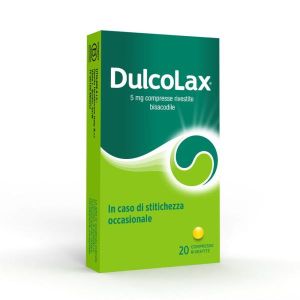Ship in Europe, Find out rates!
Dulcolax 5 mg Bisacodyl Constipation 20 Coated Tablets

- box Delivery in Italy in 24/48 and free returns
- star3.000+ positive reviews
- dropboxOver 60,000 products in the catalog
Therapeutic indications
Short-term treatment of occasional constipation.
Dosage
COATED TABLETS - Adults: 1–2 coated tablets per day. Pediatric population - Children over 10 years: 1–2 coated tablets per day. - Children aged between 2 and 10 years: 1 coated tablet per day. It is advisable to start with the lowest expected dose. The dose can then be increased, up to the maximum recommended dose, for regular stool evacuation. The maximum daily dose should never be exceeded. Instructions for use Take the coated tablets preferably in the evening to evacuate the following morning (after about 10 hours). When administered in the morning, on an empty stomach, the effect is obtained after approximately five hours. The coated tablets should not be administered together with products that reduce acidity of the upper gastrointestinal tract, such as milk, antacids (e.g. bicarbonate) or proton pump inhibitors. The coated tablets should be swallowed whole. Swallow with an adequate amount of water (a large glass). A diet rich in liquids favors the effect of the medicine. SUPPOSITORIES - Adults: 1 adult suppository (10 mg) per day. Pediatric population - Children over 10 years: 1 adult suppository (10 mg) per day. - Children aged between 2 and 10 years: 1 child suppository (5 mg) per day. The maximum daily dose should never be exceeded. Children aged 10 years and younger with chronic or persistent constipation should take Dulcolax under medical supervision. Dulcolax should not be given to children younger than two years of age. Instructions for use The effect of suppositories usually occurs in about 20 minutes (range: 10 - 30 minutes). Do not exceed the recommended dose. Laxatives should be used as infrequently as possible and for no more than seven days. Use for longer periods of time requires a doctor's prescription after adequate evaluation of the individual case.
Overdose
Symptoms Excessive doses can cause abdominal pain and diarrhea, and significant losses of potassium and other electrolytes. Chronic overdose of Dulcolax, like other laxatives, can cause chronic diarrhea, abdominal pain, hypokalemia, secondary aldosteronism and kidney stones. In association with chronic laxative abuse, renal tubular injury, metabolic alkalosis and muscle weakness secondary to hypokalaemia have also been described. See also the information in the section "Special warnings and precautions for use" about the abuse of laxatives. Treatment If taken shortly after ingestion of the oral form of Dulcolax, absorption can be reduced or avoided by induction of vomiting or gastric lavage. Leaking fluids and electrolytes must be replaced. This is particularly important in elderly and young patients. The administration of spasmolytics may be useful.
Contraindications
Hypersensitivity to the active substance or to any of the excipients. Dulcolax is also contraindicated in patients with paralytic ileus, acute abdominal conditions, such as appendicitis, and severe abdominal pain associated with nausea and vomiting which may be indicative of serious medical conditions, intestinal obstruction or stricture, acute inflammation of the gastrointestinal tract, bleeding rectal of unknown origin, severe dehydration. Pregnancy and lactation (see section 4.6). The use of Dulcolax is contraindicated in case of rare hereditary conditions which may be incompatible with the intake of any of the excipients (see section 4.4 "Special warnings and precautions for use"). Dulcolax is contraindicated in children under 2 years of age. Suppositories are contraindicated in cases of anal fissures and ulcers (pain and perianal bleeding may occur).
Side effects
The most commonly reported side effects during treatment with Dulcolax are abdominal pain and diarrhea. Immune system disorders : anaphylactic reactions, angioneurotic edema as well as other hypersensitivity reactions. Metabolism and nutrition disorders : dehydration. Nervous system disorders : dizziness, syncope. The phenomena of dizziness and syncope that occur after taking bisacodyl appear to be attributable to a vasovagal response (resulting, for example, from abdominal pain, or from the evacuation of stools). Gastrointestinal disorders : abdominal cramps, abdominal pain, diarrhea, nausea, haematochezia (blood in the stool), vomiting, abdominal discomfort, anorectal discomfort, colitis.
Pregnancy and breastfeeding
Pregnancy There are no adequate and well-controlled studies on the use of the drug in pregnancy. Therefore, although no adverse or toxic effects have ever been reported during pregnancy, like all medicines, Dulcolax should only be used as needed, under the direct supervision of the doctor, after evaluating the expected benefit for the mother in relation to the possible risk to the fetus. Fertility Studies to investigate the effects on human fertility have not been conducted. Breastfeeding Clinical data show that neither the active form of bisacodyl BHPM, bis– (p – hydroxyphenyl) –pyridyl – 2 – methane (BHPM), nor its glucuronic derivatives are excreted in breast milk, however the medicinal product should only be used in case of necessity, under the direct supervision of the doctor, after evaluating the expected benefit for the mother in relation to the possible risk for the infant.
Special warnings
Warnings Like all laxatives, Dulcolax should not be taken continuously every day or for long periods of time without investigating the cause of constipation. In case of diabetes mellitus, hypertension or heart disease use only after consulting your doctor. The abuse of laxatives (frequent or prolonged use or with excessive doses) can cause persistent diarrhea with consequent loss of water, mineral salts (especially potassium) and other essential nutritional factors. In the most severe cases, dehydration or hypokalaemia may develop, which can lead to cardiac or neuromuscular dysfunctions, especially in the case of simultaneous treatment with cardiac glycosides, diuretics or corticosteroids. Intestinal fluid loss can cause dehydration. Symptoms can be thirst and oliguria. In patients, for whom dehydration can be dangerous (patients with renal insufficiency, elderly patients), treatment with Dulcolax should be stopped and restarted only under medical supervision. Patients may experience hematochezia (blood in the stool), which is usually mild and goes away on its own. The abuse of laxatives, especially contact laxatives (stimulant laxatives), can cause addiction (and, therefore, the possible need to gradually increase the dosage), chronic constipation and loss of normal intestinal functions (intestinal atony). Cases of dizziness and / or syncope have been reported after taking Dulcolax. The data relating to these cases suggest that the events, rather than a phenomenon related to the intake of Dulcolax, could be interpreted as a manifestation of "defecation syncope" (attributable to the effort of the act of defecation), or as a vasovagal response to abdominal pain related to constipation itself. The use of suppositories can lead to painful sensations and local irritation, in particular, in patients with fissures and ulcerative proctitis (see section 4.3 "Contraindications"). Important information about some of the ingredients : Dulcolax tablets contain 33.2 mg of lactose equivalent to 66.42 mg when taken at the maximum daily dose, for the treatment of constipation in adults and adolescents over 10 years of age. Patients with rare hereditary problems of galactose intolerance, the Lapp lactase deficiency or glucose-galactose malabsorption should not take tablets of this medicine. Dulcolax tablets contain 23.4 mg of sucrose equivalent to 46.8 mg when taking the maximum daily dose for the treatment of constipation in adults and adolescents over 10 years of age. Patients with rare hereditary problems of fructose intolerance, glucose-galactose malabsorption, or sucrase-isomaltase deficiency should not take tablets of this medicine. Dulcolax tablets can cause stomach upset and diarrhea. Precautions for use In children aged 2 to 10 years, the medicinal product can only be used after consulting your doctor (see section 4.3). Like all laxatives it should not be taken daily or for prolonged periods without first evaluating the cause of constipation. The treatment of chronic or recurrent constipation always requires the intervention of the doctor for the diagnosis, the prescription of drugs and the surveillance during the course of therapy. Consult your doctor when the need for the laxative derives from a sudden change in previous bowel habits (frequency and characteristics of bowel movements) lasting more than two weeks or when the use of the laxative fails to produce effects. It is also advisable for elderly people or those in poor health to consult their doctor before using the medicine.
Expiry and Retention
Coated tablets: This medicinal product does not require any special storage conditions. Suppositories: store at temperatures no higher than 30 ° C.
Active principles
COATED TABLETS One coated tablet contains: 5 mg bisacodyl. Excipients: lactose, sucrose, castor oil. ADULTS SUPPOSITORIES One suppository contains: bisacodyl 10 mg. CHILDREN SUPPOSITORIES One suppository contains: bisacodyl 5 mg. For the full list of excipients, see section 6.1.
Excipients
COATED TABLETS Lactose monohydrate , corn starch, soluble starch, glycerol, magnesium stearate, sucrose , talc, gum arabic, titanium dioxide (E171), methacrylic acid / methyl methacrylate copolymer (1: 1), methacrylic acid / methyl methacrylate copolymer (1 : 2), castor oil , macrogol 6000, iron oxide (E172), white wax, carnauba wax, shellac. SUPPOSITORIES Triglycerides of saturated fatty acids.
| Destination | Cost | Detail |
|---|---|---|
| Italy | €5,90* | 24/72H |
| Austria, France, Germany, Slovenia | € 13* | 3 days |
| Belgium, Luxembourg, Portugal, Netherlands, Spain | € 14* | 4 days |
| Bulgary, Cechia, Hungary, Poland, Romania, Slovakia | € 19* | 5 days |
| Denmark, Estonia, Finland, Ireland, Lithuania, Latvia ,Sweden | € 22* | 5 days |
| United Kingdom, Switzerland, Greece, Malta/td> | € 30* | 7 days |
| Canada | € 40 | 7 Days |
European shipments with express courier: FedEx, MBE, DHL
*For the shipment outside band B ther's an extra cost of 22€ *For the shipment outside band C ther's an extra cost of 30€ Delivery Times exclude Saturday and Holidays
For Islands and Areas of difficult Accessibility the shipments are made in 72 hours and the cost will be increased by 15€


